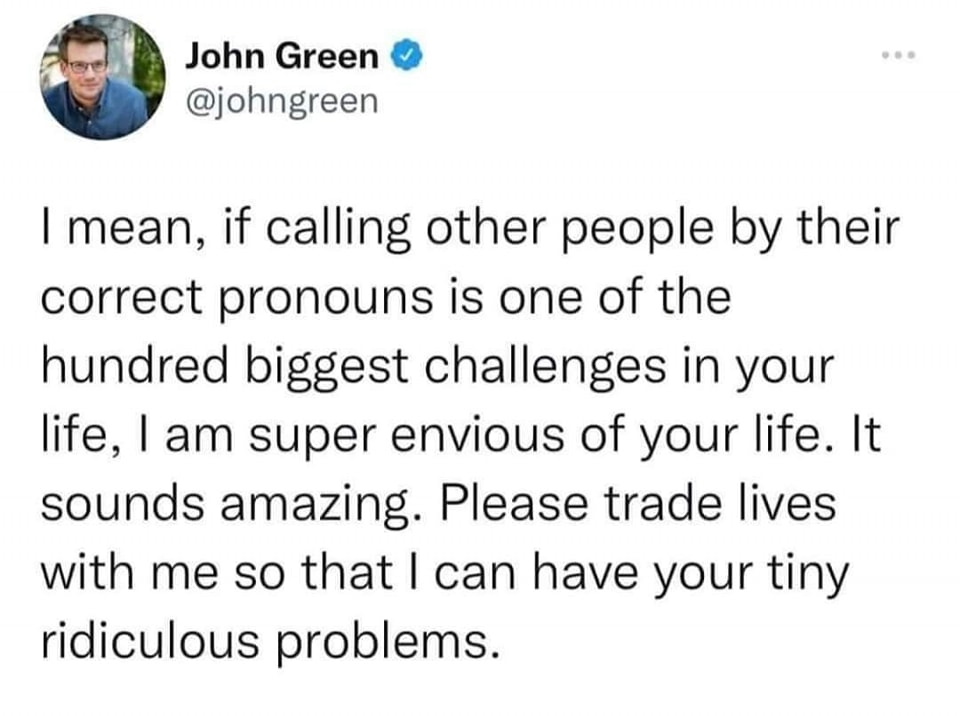this post was submitted on 28 Apr 2024
1543 points (92.3% liked)
Microblog Memes
6289 readers
2535 users here now
A place to share screenshots of Microblog posts, whether from Mastodon, tumblr, ~~Twitter~~ X, KBin, Threads or elsewhere.
Created as an evolution of White People Twitter and other tweet-capture subreddits.
Rules:
- Please put at least one word relevant to the post in the post title.
- Be nice.
- No advertising, brand promotion or guerilla marketing.
- Posters are encouraged to link to the toot or tweet etc in the description of posts.
Related communities:
founded 2 years ago
MODERATORS
you are viewing a single comment's thread
view the rest of the comments
view the rest of the comments

Alright, I made this comment in another thread but I'm copying it here. No, it has been used to refer to people of a known gender for centuries:
https://www.englishgratis.com/1/wikibooks/english/singularthey.htm
I already mentioned that we can get grammatical "they" with non-definite/unknown referents (your first and third examples), and in the second example Shakespeare is clearly referring to all mothers with "them", so none of these are counterexamples to my generalization above. I think you'll be hard pressed to find many examples with a specific, definite antecedent (though it is possible, of course - grammaticality is a spectrum, after all).
This distinction, as well as the fact that modern speakers are showing various innovative uses of "they", has been well known for decades in the linguistic literature.
It kinda grinds my gears when people intentionally (or maybe just ignorantly in this case) misconstrue linguistic data to support their political positions, and that includes all of the boneheads acting like singular "they" isn't a thing at all for their own nefarious purposes as well.
It doesn't matter that English hasn't had specific singular "they" until Gen Z. That's just a fact of history and language, and has (or at least should have) nothing to do with the rights of non-binary people.
Stop using bullshit linguistic data to try to justify your political positions! All of you! This is how we get Hindu nationalists justifying their oppression of Muslims with ridiculous claims that Sanskrit is the original human language. Language is just language!
Edit: I just went and read your other thread, and it does appear that you're just being disingenuous at this point, or at least doubling down after being proved incorrect. Your own source pointed out that Shakespeare would not have used "they" with specific individuals. Thymos is completely (and demonstrably) correct.
The gender is known though. What a weird distinction to make that it's talking about an abstract gendered person rather than concrete. I don't know why the grammar would make that distinction (nor do I think it does).
Sure, but it's in the singular. It's "a mother" as the subject, not mothers.
The argument that is almost always made is that "they can't be singular." That argument is clearly bogus. Sure, maybe it historically hasn't been used for a particular subject, but that's a fairly minor grammatical shift. If we're going to argue that's wrong because it isn't historically accepted then we probably need to speak a totally different version of English than we do because it has made much larger shifts than that in the past.
Then you're gonna be absolutely gobsmacked by the other grammatical distinctions that exist across the world's languages.
It doesn't matter if you know why the grammar would make that distinction or not - the distinction exists, and is widely accepted in the linguistic literature (as cited above) whether you think it does or not.
I'm not sure what that has to do with our conversation, since I've never made that claim (and neither did Thymos). If that's what you're basing your argument on here, then that's a pretty egregious strawman of my position.
And yet it exists nonetheless, rendering your "correction" of my original comment (and your "correction" of Thymos's comments in the other thread, for that matter) inaccurate and misleading.
I haven't argued that anything is "wrong" other than your description of the historical use of English pronouns. Linguistics is descriptive, not normative, which means that the historical facts of English have no bearing whatsoever on what we "probably need" to do.